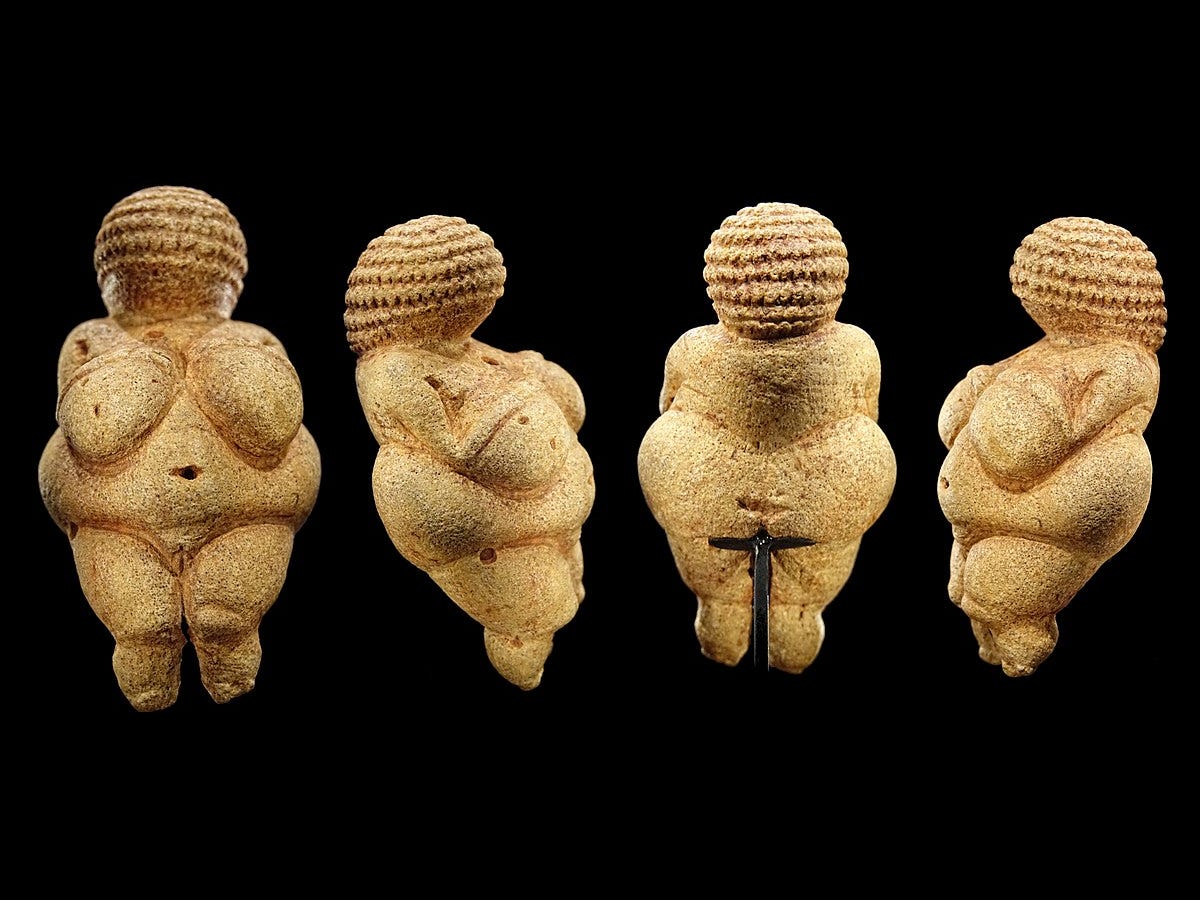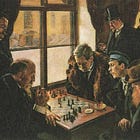#4 in a letter exchange with
In the hazy ether of history and before, our ancestors clung to any means of survival. They adapted and changed, experimenting to find what would help individuals and their clans thrive in a world where threats lurked around every corner. Complexity added nuance to once simple vehicles, creating customs and manners, each with its own meaning. Out of this ether came patriarchies, the world of father-rule.
Evolution granted human males with a wide array of physical capabilities, making them—on average—superior hunters, trackers, laborers, and warriors than their counterparts. “The fairer sex,” on the other hand, took a different evolutionary path, developing bodies better suited for endurance1, flexibility, childbearing, and foraging. With advantages that were more immediately useful in a physically demanding world, males climbed social hierarchies of clans faster. They could provide for females, children, and the elderly. Fathers became seen as the ultimate provider for their kin, perhaps spawning the earliest patriarchies.
This is an incredibly long story made short. Since prehistory, patriarchies have grown increasingly complex, though their underlying traits remain the same. My fellow writer
reminds us:A patriarchal society, both from the old definitions and from an examination of history, is one in which fathers rule. Societies with strong family jurisdictions where the male head of multiple households, even after he is dead, continues to have strong actual authority. People actually do what he says. Father-ruler.
Thus a patriarchal society is one in which fathers rule, and the more that fathers (and the adjacent) rule, the stronger a society is patriarchally.
In this letter exchange, Von and I are discussing whether patriarchies are intrinsic to human nature. He sits on the “yea” side, whilst I firmly believe “nay.” In discussing alternatives in (In)Evitability of Patriarchy, I proposed meritocracy—which I will explain more in-depth here.
Von applauded my efforts, it seems. However, he did mention that I failed to discuss one kind of important factor in all of this: pregnancy.
Von discusses this factor in Letter #3, Blessings of the Breasts and the Womb, and its implications on society. I had skimmed over this topic in (In)Evitability, because I was tackling our underlying questions2 from the perspective of general leadership, rather than family functioning.
However, I will be discussing pregnancy and the value of women more fully here—as well as addressing Von’s questions and concerns—in a two-part argument, exploring:
Family units under patriarchies and the problems that arise
The economy, job markets, and wider society under a capitalist meritocracy
Family & Patriarchies
In Blessings, Von reminds us that pregnancy has played no small part in societal development. From a scientific standpoint, when compared to other animals, humans take forever to gestate and even become semi-independent. Mothers are the first line of defense when it comes to caring for these adorable (albeit, needy) infants3. Both during and after pregnancy, however, a mother may be hindered from performing physical tasks. During pregnancy, specifically, she’s extremely vulnerable, making the role of her male kin as protectors all the more valuable. Her death would be detrimental to a clan, spelling the loss of both her and her unborn child(ren).
This ties into the stance that patriarchies are a result of human experimentation, and are not inherently “natural”. Clans that valued physical performance for survival recognized women could not outperform men, especially when pregnant. Successful childbirth (i.e., the mother and child survive) was crucial, as it remains today. As a result, early humans adopted a wide variety of ways to view family units and the women within.
Some did this by, presumably, worshiping the female sex:

Others developed matriarchies, with each clan/family tracing their lineage back to a “founding mother”. Others still developed into patriarchies, with mothers being seen as having the responsibility of carrying and raising the father’s children.
As Von stated, patriarchies trace their lineage back to a “founding father.” This patriarch influences his lineage long after death. (A specific value system or main profession are examples of influence.) The children of the founding patriarch must respect said influence and raise descendants to do the same. Everyone who comes after the founding patriarch is said to be “adjacent,” with those of elder generations wielding more authority. However, even within the same generation, some have more authority than others.
Given that patriarchy means “father-rule,” the successive “adjacent” heads of each generation are also fathers4. This father needn’t be the most competent or capable of leadership, but rather must have the most children, and the ability to influence them. In this world, power derives from reproduction.
Pregnancy—when stripped down to its core—is viewed as a way to gain power by numbers. The more children a father has, the more he can easily increase his influence within his clan. (Monogamy helps greatly here, allowing a father to easily keep track of his children with high paternal confidence.)
Young boys recognize this. They, too, want status and influence5. As a result, patriarchal families unintentionally foster one of the darker aspects of human history: child marriage.
Von stated:
Every time a patriarch engenders a new child, he potentially increases his patriarchalness… The younger a man gets married, the more time he will have to influence his children!
But what of the girls?
Why would women get married younger in a patriarchal society? Well, because the earlier they marry, the more children they are able to bear for their husbands, and the more adjacent they both will be to patriarchy!
Oh.
That being said, we can easily see how child marriage was so prominent throughout history. Given that some girls could theoretically give birth at age nine, it would make sense (in a twisted way), that she should be married ASAP so she can provide her husband with new offspring for over twenty years.
Understand, I am not accusing Von of promoting child marriage. What I am saying is that this is one of the historically proven downsides of patriarchy. Even there was a minimum legal age for marriage (e.g., 18), boys and girls are still pressured into marriage before their brains are even finished developing. Females are particularly impacted, as traditional patriarchal families view girls and women for their reproductive qualities. Everything else is secondary.
The value of the female is placed on whether she has children. Her status is only increased if she has more children, but there are still limits. In this world, a woman’s standing is almost wholly dependent on her husband, making it difficult to independently increase her status or family influence without some cunning or rejection of traditional values. If a woman is fortunate enough to live past menopause in later years, her status may increase(?), but this is due to a natural factor that she cannot control, further simplifying her worth.
I understand this can be perceived as a dismal outlook. In fact, after publishing (In)Evitability, a commenter stated: “I think you inadvertently undervalue[d] motherhood in a massive way.”
To clarify, I am not devaluing motherhood or parenthood, in general. Societies cannot continue without children. A loving, dedicated mother is crucial to a stable upbringing. To have a mother willing to understand, nurture, teach, and even discipline a child is a blessing that is all too uncommon. Dedicated mothers and fathers are essential.
However, to say a woman’s role is to have children first and foremost heavily restricts her value as a human. While some women love being mothers—and should be lauded for finding what brings them joy—to say there is “nothing more” in life than being a mother is subjective. To say that this is where a female derives value is shallow at best.
As I stated in (In)Evitability, “women are not wombs, just as men are not sperm.” We should not discourage women from being mothers, but we should encourage our daughters to have other pursuits in their lives both before and during motherhood. We should encourage our sons in the same vein.
Unfortunately, the traditional patriarchal lens does not allow for this discussion to take place. For a girl to reject marriage and motherhood is seen as selfish:
[Her] very existence will be to drive up the number of children the other women have to produce in order for their society to survive.
The impact of this extends beyond the home, leading to a society in which fathers and father-type figures are valued, and women are only encouraged to be mothers. Because humans dabble in extremes, this leads to a world in which women and girls are discouraged from even receiving education, entering jobs, or attempting to climb society’s ranks independently of their husbands.
This is the result of traditional father-rule.
Conversely, one can imagine the instability produced by permanent matriarchy (“mother-rule”). Rather than choose opposites, there is a third option: meritocracy. When paired with capitalism and honor, it can be fashioned into a way of life, giving each man the chance to thrive regardless of sex.
Meritocracy
“Meritocracy” is a term whose definition is often misunderstood, similar to “patriarchy.” According to Encyclopedia Britannica6, a meritocracy is:
A political, social, or economic system in which individuals are assigned to positions of power, influence, or reward solely on the basis of their abilities and achievements and not on the basis of their social, cultural, or economic background or irrelevant personal characteristics.
Additionally, the one with the most abilities would be the one who is most capable of accomplishing a specific task.
Meritocracies allow for equality of opportunity, giving all people—even those of unequal beginnings—the chance to find upward mobility. Understand, equal opportunity does not mean equal outcome. The quest for equal outcome is unrealistic (if not mathematically impossible) for a high-functioning society.
Nepotism and hereditary titles and positions have no place in a meritocracy. As fiction author Terry Mancour stated:
“It didn't matter where they came from, or who their fathers were. What mattered was the talent.”
— Terry Mancour, “Warmage”
Yes, personal preference will always remain. But the goal is to minimize irrelevant preferences and to always seek those best suited for a task.
Overall, the competition within a meritocracy drives innovation and mobility. The ambitious and competitive thrive in this world, creating great works in search of wealth and status. Even the “second-best” becomes incredible. The whole of society benefits from a capitalistic meritocracy, with each generation gaining access to a better life. (The only way one is penalized in such a world is if they refuse to seek accomplishment. In such an instance, they would not gain wealth or status.)
Ideally, families would still be valued in such a society, with accomplishments adding to a family’s honor, even if such honor cannot be used to usurp authority over authors. Each generation must earn their keep. Overall, this society should not spurn reproduction, but rather encourage it, with the goal of raising offspring who will one day contribute to the wider whole.
As for lineage tracing, this society would trace heritage through both parents. This is due to scientific fact. In terms of the day-to-day, the parent at the helm of decisions will vary, depending on who is most capable of handling a specific task. That is, every couple inherently has their own dynamic, and a husband and wife should be able to understand and respect this and be willing to work in tandem with one another.
In terms of sex, Von brought up several concerns:
I suggested that if we are going for meritocracy, a system where if someone can do something, then they should be allowed to do something, I suggested (partially kidding, but a serious point) that we should have co-ed bathrooms (meaning the room with the toilet in it), changing rooms, showers, and sports teams…
But the reason that we make a difference in our society is because one of the sexes (and it isn’t the men) feels vulnerable when the other is around, especially if they are undressed.
Given the definition of a meritocracy, these concerns are largely irrelevant. A meritocracy is about competition. Showering, changing rooms, restrooms, and other such places are not grounds for competition. (Unless there’s a pro showering league I’m not aware of...) Further, to eliminate this boundary would be to expose women and children to violence, though that is beyond the scope of this essay.
In terms of sports, let’s return to the definition of a meritocracy: competition that overlooks “irrelevant personal characteristics.” For competitive physical sports7 , sex-based differences are no longer “irrelevant personal characteristics.” Firstly, females can get severely injured in various sports if they compete against men, such as in boxing—creating an instance of unmeaningful competition, where the average woman is at a physical disadvantage against the average man. (It’s like putting an adult heavyweight against a teenage bantamweight.) Second, men and women cannot always perform physical tasks with a similar amount of efficacy, such as in the case of gymnastics, where men’s and women’s routines can be starkly different.8 With all this in mind, men and women must be allowed to compete in separate divisions. However, within these divisions, meritocracy reigns.
Overall, meritocracy needn’t wholly ignore physical sex-based differences.
This leads me to discuss meritocracy in jobs and the free markets.
In Blessings, Von discusses meritocracy in hiring and how it relates to workplace culture, where he states:
Each individual then has to fit into the entire society… of the company and the overall culture. What if the best meat packer can’t get along with anyone?
In instances such as this, an organization must do some analysis. Why doesn’t the meat packer get along with the others? Is it the culture itself or is the meat packer just a jerk? What is a solution? It behooves the organization to do this if they want to keep the best man in the field, otherwise, the worker will simply leave to somewhere better suited.
And the meat packer should have this right. He should go where he has the most market-determined value, providing his skills to the company that sees it prudent to provide him with the highest level of stability the markets, wider economy, and negotiation will allow.
Likewise, a company has the right to develop whatever culture it pleases, but it should understand the consequences that come along with it. If a workplace is “toxic”, then the organization shouldn’t be surprised if no one wants to work there, or if output is of poor quality. Theoretically, the company with the best culture attracts the best workers, creating success in line with the company’s mission.
Von continues:
It used to be that employers would deliberately prefer to hire married men with families. It seems prejudicial and stupid to us… but was it? The married man was supporting a wife and children… who were part of the society and culture that the employer was also part of!
Companies—if they are wise—are meritocratic by default. By selecting those most able to effectively complete a needed task from the available hiring pool (i.e., the best), organizations increase their chances of meaningful collaboration and production. In this manner, they provide consumers with a higher quality of goods and services. The companies who select those based on favoritism, politics, shared alumni, etc., may have some early success, but will eventually fail due to potentially selecting those with lesser merit. Market competition will be their demise. (The only companies that can get away with this are monopolies, because there is no competition to drive them out of business.) The company that selects new hires based on marital status is doomed to share the same fate. This is why companies began “diversifying” well before affirmative action. They realized that, in an increasingly globalist and competitive world, they could no longer hire based on arbitrary factors if they wanted to survive.
This extends to the sex of employees. To have a large all-male company (or even an all-female company) in a capitalist economy is futile. This can only work for small companies, but as time goes on, it will become increasingly difficult to seek out high-quality employees based on sex. The quality of employees (and output, by extension) will decrease eventually. Employees should be hired regardless of sex. And the government needn’t set laws and regulations to ensure this. That should be left to the markets.
Meritocracy also be applied in non-corporate settings, such as government organizations and affiliated institutions. Take NASA and MIT during the 1960s. Had hiring and promotion been based on one’s parental and/or marital status (i.e., hiring married men with children), Margaret Hamilton would not have become a leading software engineer, and the Apollo 11 mission would have been stalled or even impossible. It was meritocracy that allowed humans to land on the Moon and return safely.
There is one final concern I want to address from Von. In discussing meritocracy and sports, he says:
I suggested that if we are going for meritocracy, a system where if someone can do something, then they should be allowed to do something…maybe some guys want to play field hockey!
This brings up the point of consumers and their market impact. Men can play field hockey all they want, but if there isn’t a substantial demand9 for a league, then it will not exist. This is not a case of sexism, merely economics.
Conclusion
I could go on and on about the differences between men and women. I could talk endlessly about differences in physicality, aesthetics, emotional expression, upbringing, and even the slang they use. However, never will I say that one sex is inherently fit to rule, even in a family.
Von mused that he and I would agree on many things if we were to sit and chat. We would, I’m sure. He and I both agree on the removal of the death tax', or that there is nothing inherently wrong with more men choosing to become engineers.
However, I disagree greatly with him that patriarchies are intrinsic to the human condition. Indeed, I disagree with many people on matters of sex. This is because I seek a world in which humans have the most reasonable freedom. This line of thinking breaks many traditions, maintains others, and calls for new ones. And though suffering cannot be eliminated, it can be lessened under a meritocracy. No one should be pressured to marry. No one’s social value should be restricted because of the sex with which they were born.
Patriarchy is only inevitable for those who allow themselves to be ruled in such a manner. However, in doing this, they risk exposing themselves to dehumanization and the rule of tyrannical father figures.
Haizlip KM, Harrison BC, Leinwand LA. Sex-based differences in skeletal muscle kinetics and fiber-type composition. Physiology (Bethesda). 2015 Jan;30(1):30-9. doi: 10.1152/physiol.00024.2014. PMID: 25559153; PMCID: PMC4285578.
“Are patriarchies intrinsic to human nature? What are the alternatives?”
As Dennis Prager said: “I want Mommy. I want milk. I want to be held. I want to be comforted. And if you do not do all these things immediately, I will ruin your life.”
That is, instances of female heads in a patriarchal family are the exception.
This is not considering any coming-of-age rituals or other ways a boy can gain status (e.g., monetary wealth, community influence, etc.).
https://www.britannica.com/money/topic/meritocracy
Excludes mental sports (e.g., chess) and machine-assisted sports (e.g., sharpshooting).
Men’s gymnastics focuses primarily on upperbody strength, whereas women’s gymnastics focuses primarily on lowerbody strength and flexibility.
Demand comes from: A) players, who would warrant the creation of a league; B) consumers, who would purchase tickets and (possibly) merchandise.










> The fairer sex,” on the other hand, took a different evolutionary path, developing bodies better suited for endurance1, flexibility, childbearing, and foraging.
Though it's buried in a large archive of files, you might find these two articles interesting in that regard:
https://thingstoread.substack.com/p/how-did-humans-domesticate-themselves
https://thingstoread.substack.com/p/most-models-arent-even-useful
> Von and I are discussing whether patriarchies are intrinsic to human nature.
He hasn't met my in-laws.
Seriously, hasn't Von observed that variation in personality is broad enough that sometimes you just end up with a man who is less dominant than his wife or daughters? Granted I'm probably way older than he is, but by the time I was twelve I'd already visited a friend where the woman clearly wore the pants - and this was a conservative American household I'm talking about. Maybe a statistical *tendency* to patriarchy is intrinsic to human nature, OK, but that's all it's going to be.
> after publishing (In)Evitability, a commenter stated: “I think you inadvertently undervalue[d] motherhood in a massive way.”
> To clarify, I am not devaluing motherhood or parenthood, in general.
Well that was a very tactful way of glossing over some of the most irritating comments I've seen in a long while!
> We should not discourage women from being mothers, but we should encourage our daughters to have other pursuits in their lives both before and during motherhood. We should encourage our sons in the same vein.
Here I feel like invoking David Hume and hitting you with the is-ought fallacy, though I suspect you may be doing this because you're still be a bit cringey after encountering Dr. Tara Slatton
> No one’s social value should be restricted because of the sex with which they were born.
OK, I'll bite: In a post-apocalyptic world (or 19th century Australia, whatever) where there are six times as many males as females, do you *really* think it makes sense to value a boy as much as a girl?
My response is scheduled for Tuesday morning. I've been sick, busy, and out of town... so this week is basically toast :)